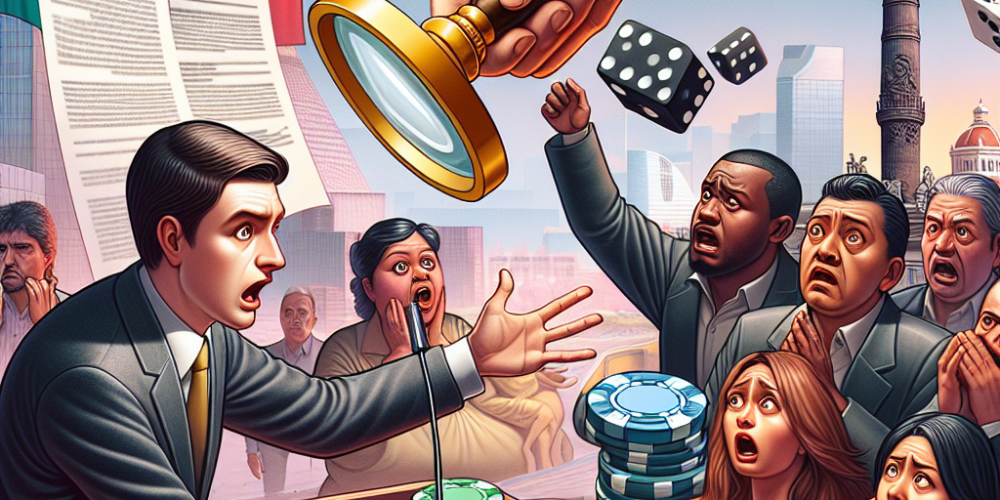In September 2025, Mexico’s finance minister Édgar Amador proposed a substantial hike in the tax on casinos and online gaming, aiming to amend the Special Tax on Production and Services (IEPS). This proposal suggests raising the current gross gaming revenue (GGR) tax from 30% to an unprecedented 50%, signaling a seismic shift in the nation’s approach to gambling taxation.
The IEPS, a tax already in place for a variety of products like carbonated drinks and tobacco, currently imposes a 30% levy on gaming operators. Amador’s plan would nearly double this rate, a move likely to have significant repercussions across the gambling industry. Additionally, the proposed changes include an 8% tax on video games with adult content or in-game purchases, further broadening the scope of taxable activities within the entertainment sector.
The rationale behind this tax overhaul, according to Amador, is to bolster government revenues at a time of financial strain. The government anticipates raising approximately $467 billion, an amount touted as crucial for addressing the country’s budget deficit. While this potential revenue boost is appealing to lawmakers, the industry braces for the impact of increased costs.
Operators within Mexico’s gaming sector are already contending with a 30% corporate income tax on top of the existing IEPS. The proposed tax hike would exacerbate these financial pressures, with some regions adding their own local taxes to the mix. While operators can currently deduct up to 20% of their IEPS payments to offset local and regional taxes, a 50% IEPS would represent a heavy burden.
Despite aging regulatory frameworks, Mexico’s gaming industry has been thriving, particularly online gaming. Yet, the proposed tax increase could eclipse this growth. Voices from within the industry express concern: How can operators sustain business with such a steep financial obligation? The sentiment echoes through the sector, as Amador’s announcement reverberates.
This move by Mexico aligns with a global trend towards higher gambling taxes. Various jurisdictions, including several US states, have recently introduced similar measures. Illinois, for instance, faced backlash from operators forced to introduce surcharges to cope with increased taxes, a move that proved unpopular among consumers.
January saw the Netherlands raise its gambling tax in a similar bid to increase state revenue. However, this measure reportedly backfired, hurting the industry as the local regulator reported adverse impacts. The UK horseracing industry has also reacted strongly against aligning online gaming taxes, citing disproportionate effects on their sector.
Critics of Amador’s proposal argue that it might deter investment and drive smaller operators out of the market, ultimately leading to a less competitive industry. The proposed 50% tax rate dwarfs that of many other markets, potentially making Mexico an unattractive location for new entrants and stifling innovation.
Supporters, however, believe that the increased taxation on gambling firms is justified, as these businesses have seen considerable growth and profitability. They argue that the sector can and should contribute more to the national economy, especially during fiscal downturns. Proponents see it as a necessary step to redistribute wealth and support public services.
As Mexico weighs this decision, stakeholders in gambling industries across the globe watch with keen interest. The outcome could set a precedent, influencing how other countries approach gaming taxation. Whether the tax hike will achieve its intended economic benefits without stifling industry growth remains an open question.
Ultimately, the debate centers around balancing government revenue needs with the vitality of the gaming industry. The proposal underscores the challenges governments face in regulating and taxing rapidly evolving sectors like gaming. As Mexico edges closer to a decision, the stakes are high, and the discourse surrounding gambling taxation is likely to intensify.

David Garato is a luminary in gaming journalism, renowned for peeling back the curtain on the gaming world with his witty and insightful commentary. A decade into weaving stories from the pixelated edges of indie games to the expansive universes of AAA titles, David’s work is a thrilling blend of analysis and adventure. When not writing, he’s live-streaming, sharing his gaming exploits with an engaged and growing audience. David doesn’t just write about games; he lives them, making him a trusted guide in the gaming community.
















